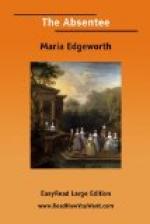‘No, sir, you are not an insulated being,’ said Lord Colambre ’you have a near relation, who will, who must be dear to you; who will make you amends for all you have lost, all you have suffered—who will bring peace and joy to your heart. You have a grand-daughter.’
‘No, sir; I have no grand-daughter,’ said old Reynolds, his face and whole form becoming rigid with the expression of obstinacy. ’Rather have no descendant than be forced to acknowledge an illegitimate child.’
‘My lord, I entreat as a friend—I command you to be patient,’ said the count, who saw Lord Colambre’s indignation suddenly rise.
‘So, then, this is the purpose of your visit,’ continued old Reynolds; ’and you come from my enemies, from the St. Omars, and you are in a league with them,’ continued old Reynolds; ’and all this time it is of my eldest son you have been talking.’
‘Yes, sir,’ replied the count; ’of Captain Reynolds, who fell in battle, in the Austrian service, about nineteen years ago—a more gallant and amiable youth never lived.’
Pleasure revived through the dull look of obstinacy in the father’s eyes.
’He was, as you say, sir, a gallant, an amiable youth, once and he was my pride, and I loved him, too, once but did not you know I had another?’
’No, sir, we did not—we are, you may perceive, totally ignorant of your family and of your affairs we have no connexion whatever or knowledge of any of the St. Omars.’
‘I detest the sound of the name,’ cried Lord Colambre.
’Oh, good! good!—Well! well! I beg your pardon, gentlemen, a thousand times—I am a hasty, very hasty old man; but I have been harassed, persecuted, hunted by wretches, who got a scent of my gold; often in my rage I longed to throw my treasure-bags to my pursuers, and bid them leave me to die in peace. You have feelings, I see, both of you, gentlemen; excuse me, and bear with my temper.’
’Bear with you! Much enforced, the best tempers will emit a hasty spark,’ said the count, looking at Lord Colambre, who was now cool again; and who, with a countenance full of compassion, sat with his eyes fixed upon the poor—no, not the poor, but the unhappy old man.
‘Yes, I had another son,’ continued Mr. Reynolds, ’and on him all my affections concentrated when I lost my eldest, and for him I desired to preserve the estate which his mother brought into my family. Since you know nothing of my affairs, let me explain to you; that estate was so settled, that it would have gone to the child, even the daughter of my eldest son, if there had been a legitimate child. But I knew there was no marriage, and I held out firm to my opinion. “If there was a marriage,” said I, “show me the marriage certificate, and I will acknowledge the marriage, and acknowledge the child;” but they could not, and I knew they could not; and I kept the estate for my darling boy,’ cried the old gentleman, with the exultation of successful




